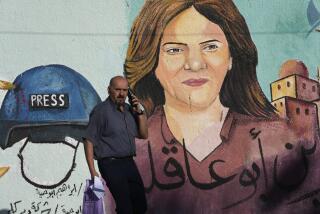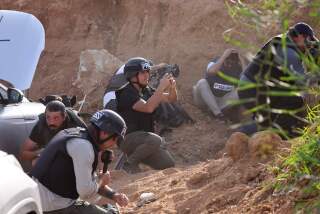Libya keeps foreign journalists on tight leash
A burst of gunfire and squealing tires kicked off what was scheduled to be a day of anti-government protests in Tripoli, Libya’s capital. The foreign journalists in town, all watched by minders, struggled to find out what was happening.
“Al Qaeda is on the loose,” claimed an official of the Ministry of Foreign Affairs’ press division. The terrorists, he said, want to turn the country into Iraq. But there was no reason to panic. The Libyan government would not allow any harm to befall the journalists, by simply barring them from venturing outside.
Those who tried to leave the two hotels where the journalists are staying to cover the protests were physically prevented from doing so. Instead, they were told they would be flown for the day to an oasis town hundreds of miles away.
After a frantic call by a journalist to Seif Islam Kadafi, the son of longtime Libyan strongman Moammar Kadafi, the house arrest was lifted. And despite the purported Al Qaeda threat, multiple pro-government rallies had broken out across the city that the reporters were allowed to cover.
Foreign correspondents in authoritarian states have long been used to handling tough stories under tight restrictions. But working in Libya has an almost surreal quality, including a frenzied incident Tuesday in which Kadafi strode into one of the hotels near midnight, more than eight hours after reporters were told he was about to arrive, and proceeded to leave without saying anything except to French and Turkish journalists.
Tripoli these days is a place where government agents in leather trench coats and sunglasses hover at hotel entrances. Where “spontaneous” pro-government rallies break out just as busloads of journalists escorted by the government arrive in a town. Where top officials, including Kadafi and Seif Islam, personally urge journalists to take taxis and visit neighborhoods in the capital, but their minions prevent them from doing so.
At least until they suddenly disappear for lunch.
Libyan authorities invited foreign journalists to Libya as a gambit to show the world that the pan-Arab Al Jazeera and Al Arabiya television networks had exaggerated the extent of the government’s violence against its opponents, underestimated popular support for Kadafi and overblown the reports of chaos in outlying regions after anti-government protests and armed conflict.
But the invitation, as it turns out, has had significant strings attached.
Simply put, the 150 or so journalists in town are not free to report as they desire. They are told by minders that they must be accompanied at all times. The reason drastic precautions are necessary, government officials say, is to protect the journalists from terrorists, criminals and overzealous media critics.
“I know there are local people here that are ready to cause problems for you because they are not happy with the coverage,” Khaled Kaim, a Foreign Ministry official, told reporters Sunday.
Yet journalists who have attempted to sneak away from minders and verify the facts have at times been detained by Libyan security forces, rather than by opposition activists and dissidents they have managed to locate and discreetly interview.
Employees of eight news organizations, including the Los Angeles Times, BBC and Agence France-Presse, were detained Saturday on the outskirts of Zawiya and held for nearly seven hours by security forces. They were given tea and juice boxes, but there was a menacing air to the experience. At one point, a gunman threatened to blindfold the journalists and haul them to an undisclosed location to be questioned by an official.
A three-member BBC team that set out for Zawiya on Monday was arrested and held overnight by security forces.
Adding to the confusion, some government minders are less stringent than others, urging reporters to take taxis to run simple errands. One minder escorted some journalists to a rally Sunday, only to ditch the group.
“It is intrusive, but it also has an arbitrary, inconsistent quality which makes things particularly difficult,” said a correspondent for a British newspaper, who asked that his name and news organization not be published.
Adding to the strange atmosphere is the apparent willingness of Libyans in positions of power to make assertions that just don’t seem to jibe with the facts on the ground.
For days, Libyan officials maintained that Zawiya had been conquered by government forces, an assertion baldly contradicted by opposition supporters reached in the city and even by Libyan troops surrounding the coastal enclave and girding for one of many armored assaults that have so far failed to dislodge the city center from rebel control.
And Sunday, state television announced that government loyalists had taken over rebel-controlled cities deep inside eastern Libya. Government supporters, most of them with ties to the security forces or the state bureaucracy, took to the streets to celebrate, firing automatic weapons into the air and leaning on their car horns.
But the claims of victory did not square in the least with accounts by representatives of the rebel interim government and the many journalists based in the opposition’s capital, Benghazi. Instead, correspondents reported that rebel forces were advancing west along the Mediterranean coast toward the Kadafi stronghold of Surt.
The conditions for reporting bear little resemblance to those the Libyan government claims are the case. In a letter Thursday to the United Nations Security Council, the Foreign Ministry wrote:
“No restrictions are imposed on foreign media. Media correspondents work freely in Libya, and all the necessary facilities are provided for them. They have freedom of movement, except in areas controlled by Al Qaeda terrorists.”
Journalists who previously worked in Libya say it has always been a tough beat, with government agents shadowing them in comically obvious ways. These days, the consequences of mistakes by journalists are particularly worrisome.
“To do any independent journalism at all and to protect your sources, you have to go to extraordinary lengths,” said Peter Beaumont, a reporter for the Guardian, a British daily. “People won’t talk to you on the streets or in their homes. They’ll tell you to meet them after dark or at a half-finished building or whisper to you at a pro-Kadafi rally.”
At the same time, it’s probably easier to break free of the overworked handlers, civil servants who are generally amicable and attempt to be helpful. So far no journalist here has been booted out of the country for violating any of the unspecified rules that govern their actions.
“To be a journalist in Libya has never been easy,” said one Italian correspondent here who has reported in Libya many times. “But they’re not used to dealing with so many of us, which makes it a littler easier.”
More to Read
Start your day right
Sign up for Essential California for news, features and recommendations from the L.A. Times and beyond in your inbox six days a week.
You may occasionally receive promotional content from the Los Angeles Times.






